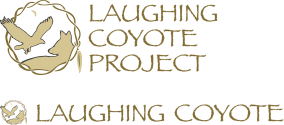At Laughing Coyote, we use primitive skills to connect to the natural world. “Why primitive skills?” one might ask. We define primitive skills as “First Skills”, the skills practiced and used by our ancestors in daily life. We have found that in the practice of primitive skills, the skills used by our collective ancestors, we strip away the layers disconnecting us from the earth, and begin to form profound authentic relationships to our selves, our community and the natural world.
There are many misconceptions about the skills, and the correct context. Our goal here to offer an idea of what we are trying to accomplish, and what Laughing Coyote is not. Please understand that there is quite a bit of overlap between outdoors skills, and we have been known to jump back and forth, though always explaining ourselves along the way. For example, the bowdrill, a method of starting friction by fire, is a primitive skill, that could be used in a survival situation, and is used on bushcraft trips. Understanding context is key.
All of our instructors are passionate students as well as teachers. We are not masters of these skills, merely further along on our journey. There is a great deal we do not know. However, as passionate students, we live the skills everyday, practicing, searching out the best teachers we can find, attending gatherings and being a part of the cross-pollination of skills.
What Laughing Coyote is NOT:
- A survival skills school. As mentioned above, many of the skills we teach are applicable in survival situations. However, we do not practice primitive skills with the intention of teaching survival. The complexity and stress of wilderness survival situations require time and dedication, which we have devoted to primitive skills.
- An offshoot of other Wilderness Survival schools. We have studied with teachers local and national. Much of what we have learned is the product of time spent practicing, and applying the skills to our daily lives. We do honor the many teachers who have helped us on our way.
What Laughing Coyote IS:
- A place where children and adults learn to reconnect to the earth.
- Where we play games, tell stories, listen to birds, look at animal tracks, cover ourselves in mud and search for the subtle yet easily lost connection to the natural world.
- We throw ourselves into primitive and traditional skills. Each instructor has their specialty that they bring to the table, and we also invite guest instructors throughout the year to have a rich variety of programs.
- A community dedicated to learning and sharing. We did not invent the skills we are teaching, nor do they belong to us. Students coming to Laughing Coyote are embarking on regaining their birthright, the heritage and gifts that have been passed down through the generations.
Definitions:
Primitive Skills- “First Skills”, the knowledge and wisdom that was utilized by human beings around the globe in their daily life. We define primitive skills as those that were accomplished with only stone tools. Examples: friction fire, stone tools, cordage.
Ancestral Skills-The skills used by our ancestors. Many of the skills we teach are universal, meaning they were used by people all over the world. These are the skills of the past, living deep within our collective memories. Examples: bowmaking, basketry, pottery, hide tanning.
Traditional Skills- Pre-Industrial skills after the use of metal was adopted. At Laughing Coyote, we teach traditional skills, and utilize them on a daily basis, as a way to simplify our lives, live in a self-reliant manner, but still participate in the modern world. Examples: blacksmithing, canning, gardening, flint and steel firemaking, knife and axe craft.
Bushcraft-Combining backpacking with traditional and primitive skills. Intensive knowledge of knife use, fire, lightweight gear. Examples: tarp shelters, billy can cooking, spoon carving.
Survival Skills- Skills to use in a life or death situation. Emergency skills for extreme wilderness scenarios. Examples: first aid, signaling, fire making, water purification, maintaining body temperature.
Want to learn more?
Please feel free to send over any questions: we love sharing our educational philosophy, programs, and skills. And we hope to see you around the farm in Boulder County’s beautiful Colorado landscape.
Contact Us Today


